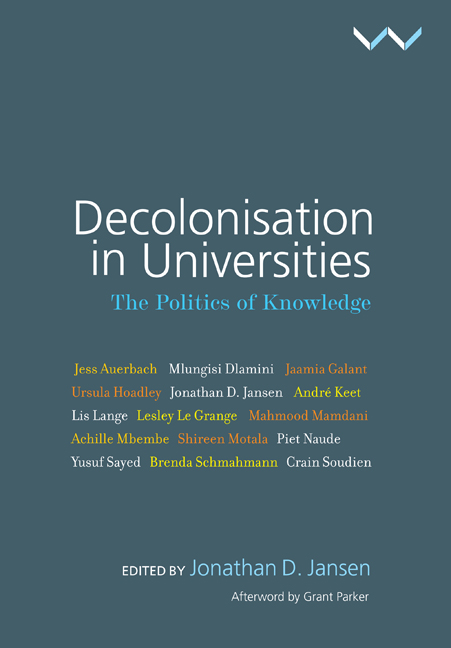Book contents
- Frontmatter
- Contents
- List of Figures
- Acronyms and Abbreviations
- Introduction and Overview: Making Sense of Decolonisation in Universities
- PART 1 THE ARGUMENTS FOR DECOLONISATION
- Chapter 1 Decolonising Universities
- Chapter 2 The Curriculum Case for Decolonisation
- PART 2 THE POLITICS AND PROBLEMS OF DECOLONISATION
- PART 3 DOING DECOLONISATION
- PART 4 REIMAGING COLONIAL INHERITANCES
- Afterword: Decolonising Minds via Curricula?
- Contributors
- Index
Chapter 1 - Decolonising Universities
from PART 1 - THE ARGUMENTS FOR DECOLONISATION
Published online by Cambridge University Press: 25 October 2019
- Frontmatter
- Contents
- List of Figures
- Acronyms and Abbreviations
- Introduction and Overview: Making Sense of Decolonisation in Universities
- PART 1 THE ARGUMENTS FOR DECOLONISATION
- Chapter 1 Decolonising Universities
- Chapter 2 The Curriculum Case for Decolonisation
- PART 2 THE POLITICS AND PROBLEMS OF DECOLONISATION
- PART 3 DOING DECOLONISATION
- PART 4 REIMAGING COLONIAL INHERITANCES
- Afterword: Decolonising Minds via Curricula?
- Contributors
- Index
Summary
Institutions of higher education originated in different parts of the world in the premodern era1, but it is only one particular historical experience, the Western, that became globalised during the modern colonial era. The modern university, as the name suggests, claims a universal significance as a site for the study of the human. Its graduates claim ‘excellence’ globally. This chapter draws on the experience of two universities, Makerere University and the University of Dar es Salaam, and the contribution of two intellectual figures, Ali Mazrui and Walter Rodney, to flesh out some key post-independence debates regarding the role of the university and the scholar. The first debate arises from the nationalist demand that the university be a site of ‘relevance’, and not just ‘excellence’. This demand informed debates over curriculum, leading to a second debate over the relationship between two different roles: those of the public intellectual and the scholar, articulated as the difference between ‘ideological orientation’ (Rodney) and ‘mode of reasoning’ (Mazrui). The chapter closes with a discussion on language. In a context where colonial languages were given official status, developing them into dynamic languages of popular culture and higher learning and scientific reasoning, the tendency was to freeze languages of the colonised into a folkloric condition due to a lack of recognition and resources. Two experiences in particular – those of Afrikaans and Kiswahili – pointed a way forward to social inclusion, creating internal institutional capacities and translation work to support African languages. The chapter claims that the cases it discusses are important not because they are representative, but because the questions they raise are of wider and general significance. The challenge in higher education, in Africa and elsewhere, is to be both responsive to the local and engaged with the global.
THE IMPORTANCE OF THEORY
Theory is born of comparison. Comparison is older than colonialism, but it matures to its fullest in the colonial period. The Greeks made modest comparisons, first between cities like Athens and Sparta. Later, they turned to larger contexts, Greece, Persia and Egypt. Then came Arabs and Berbers. The great Berber historian, Ibn Khaldun, and the Arab traveller, Ibn Battuta, compared the North African and the West African worlds. Others compared Arabia and lands to the east.
- Type
- Chapter
- Information
- Decolonisation in UniversitiesThe Politics of Knowledge, pp. 15 - 28Publisher: Wits University PressPrint publication year: 2019



